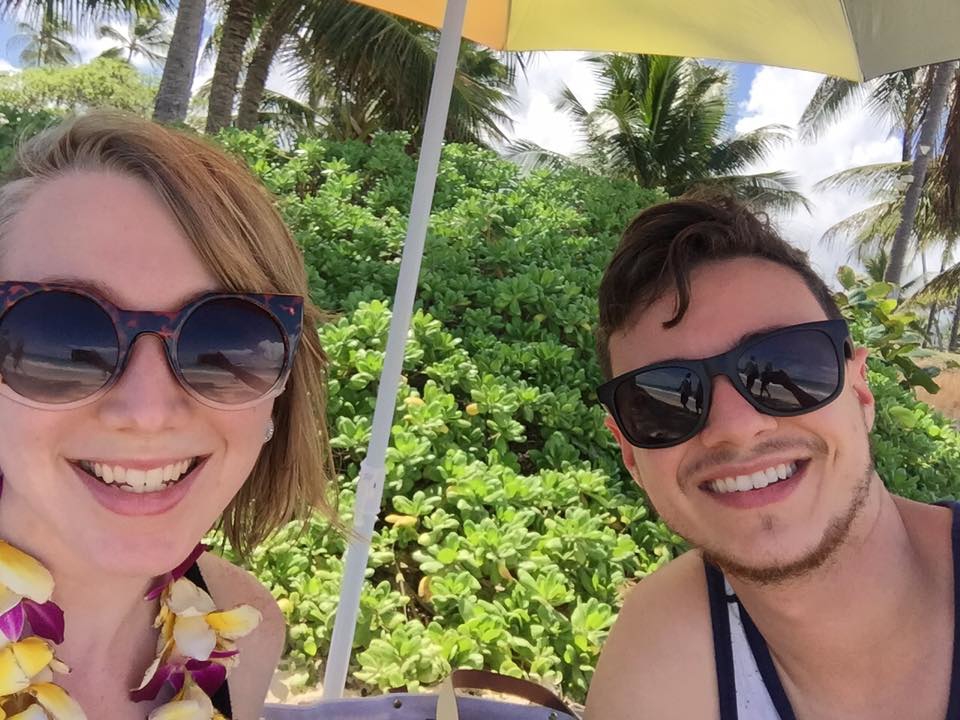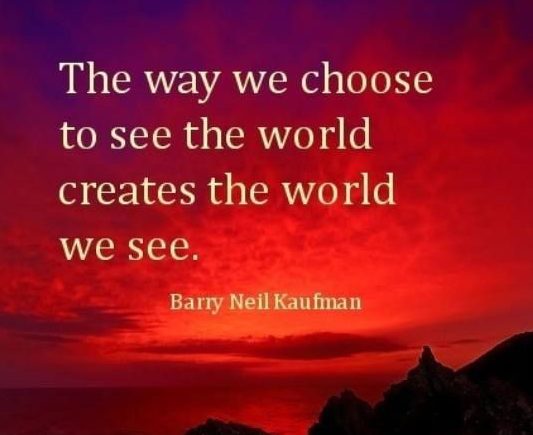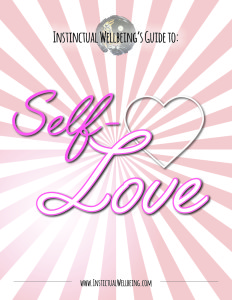I recently returned from my honeymoon vacation in Hawaii. It was an amazing time full of fun, adventure, great food, picturesque panoramic views, and relaxation. I could truly write a whole post just on how splendid this place is, but for now, hopefully a few pictures will suffice. 🙂
Us enjoying some beach time
Kailua Beach
Aside from the amazing time that we had, what I noticed most about my time in Hawaii (in addition to my general well-being and threshold for tolerating more strenuous activities and food that was 95% AIP-compliant but maybe not 100%), was actually the subtle mindset shift that was occurring inside me. I didn’t even notice this until I returned home.
Here’s what happened.
My wife and I were eating at our favorite restaurant on a Thursday around the lunch hour, and the place was packed as usual with businessmen and women. There was nothing uncommon about this – we were eating in a downtown(ish) area so I typically wouldn’t have given this mixture of businesspeople a second thought.
This time though, something felt different.
This time, I noticed them all dressed up in their suits and buried deep in their phones and inboxes, assuming postures of power and airs of false confidence amongst their colleagues, all while walking and talking so fast and loud.
After spending a week in Hawaii, where the culture, lifestyle and mindset is just pure “chill” and “everything is just fine as it is,” witnessing this behavior was almost nauseating. To be honest though, I think the most frustrating part was it felt as if I was looking into a mirror about my own life, as this was how I conducted myself the majority of the time before leaving for Hawaii.
This is when I realized a subtle mindset shift had occurred while I was on the island; something moved just slightly within me and I began to understand that I’d stumbled upon what might be the secret ingredient to healing my own autoimmunity: Perspective.
What is Perspective?
Perspective is the way in which you view the world; it’s the lens that you filter all events and experiences through, including the people, places and things you encounter. Most of the time our perspectives are created through a blend of past experiences, which create belief systems, which then color our worldview.
However, I believe that the perspective we’re most accustomed to can also be a “false perspective,” meaning – it’s not really what we believe about the world, we’re just seeing the world how we need to in order to survive and get by.
For example, ever since starting my own business, my “perspective” had been that I need to work as much as possible in order to make as much money as possible so that I could provide for my family and be happy. This became my purpose for existence and my driving force, and I was working 50-70 hour weeks to make it happen. I figured I just needed to work extremely hard and cut out any other “clutter” (i.e. the things that were important to me at a fundamental level) in order to be successful, so that’s what I did.
The problem here doesn’t lie within the fact that I was focused and driven to make money and create a life for myself and wife; that’s noble at worst. The problem here is that this new perspective that I had adopted was driven by FEAR, not my actual belief systems. I feared failure, I feared letting other people down, I feared ruining my career by leaving my comfy job and starting a business of my own.
Sometimes a little fear is good; it keeps us nimble and focused on the goal. In this case though, it shifted my worldview so much that I couldn’t focus on anything else that actually mattered to me (like spirituality, health, friendships, being creative, writing/blogging, cooking, yoga, etc.).
That’s what I mean by “false perspective” – that you’re adopting a perspective that doesn’t necessarily align with who you are. Unfortunately it took me stepping away from the office for two weeks in order to chip away at this enough so that I could reconnect with my own truth that was buried underneath, but hopefully I can save you some time and trouble by simply drawing your awareness to this.
What’s Perspective Have to do With Autoimmunity?
So as I was sitting in the restaurant, witnessing these folks who were talking a mile-a-minute without even looking up from their phones (aka myself 3 weeks ago), I thought about how I wanted to live my life moving forward.
Did I want to continue being relaxed and (re)adopting the mindset that I rediscovered on the island that everything was fine as it was, that things will get done when they get done, and that my favorite things in the world shouldn’t take the backseat to working 70 hour weeks? And, as a result, feeling relaxed and healthier than I’d felt in years?
Or did I want to revert back to my false perspective that everything was stressful, that everything was “on fire” and needed to get done right then and there, that in order to be confident I needed to puff my chest out and walk around in fancy clothes, and that in order to be successful I needed to have tunnel-vision (and load my body full of stimulants to maintain that drive)?
It was a bit of an existential moment, but ultimately I made peace with the fact that I couldn’t go back to how I was living, especially because I’m sure you can guess how that mindset was affecting my health and emotional well-being.
This is why I think perspective is the “secret ingredient” to healing autoimmunity.
When dealing with any condition, especially chronic and complex ones like autoimmunity, we have to look at the mind. We can’t just focus on our lab results, or supplements, or even diet; we have to think about how our thoughts drive our health – how we become what we think.
This is why perspective is so important when discussing autoimmunity. Do you think your body will heal more efficiently and return to a state of homeostasis if you adopt the more laid-back perspective? Or the hectic, hair-on-fire perspective? Since stress is probably the #1 driver of autoimmune conditions, I think you already know the answer to that.
I think we owe it to ourselves to take a step back and think about what our perspective is and how it is affecting our health.
As for me, I hope to ultimately achieve a balance between the two styles of thinking. There are elements of my former perspective that I think are important to keep around, like the desire to work hard, formulate a plan and stick to it, and be confident in my abilities. However, I need to blend that with the perspective that at the end of the day, everything is a-OK. Nobody will physically die if I have to reschedule a meeting. I will not lose my home if I turn away one project due to a full workload. The sun will not refuse to rise if I take 2-3 hours to play and have fun throughout my workday. Maybe I’ll call this the “Functional Islander Perspective.” 🙂
So what do you think? Are you currently operating with a TRUE perspective? Or have you adopted a FALSE perspective along the way? How do you think this is affecting your health? And, do you think that shifting your perspective could help you heal?








Mitch,
Thoroughly enjoyed your honesty and talk
in the Hashimoto’s summit.
Your wisdom far beyond your young years.
See, there is a positive side to illness…..
I know so myself.
Kind regards,
Maureen
Thank you, Maureen. I’m glad you enjoyed my talk and yes I agree, there’s absolutely a positive side to illness (it just may be harder to see at times). 🙂
I’ve been doing some soul searching myself on my perspective. I have been saying “I want off the hamster wheel” for about 3 years now. Life has been way too busy with too many demands. I’ve realized Ive had a wrong outlook & was feeling sorry for myself and resentful. My goal is to put self care & my spirituality first and find peace with the fact that I can’t do it all. If your familiar with the story of Martha & Mary in the bible, I need to switch from Martha to Mary. I really like your “functional islander perspective” and hope to be able to adopt it myself. Thanks.
That’s great to hear you’re beginning to put yourself first and focusing on adopting a more positive outlook. Thanks for reading and sharing, Holly!
About 5 yrs ago my husband and I decided we had too much stuff, it was weighing us down mentally and physically. We purged every last thing we no longer liked, used or wanted, regardless of who gave it to us (except things from our kids). We went through every room, every closet, draw or box. We looked through every photo and got rid of all the people we didn’t like, including those in our wedding album. You know, those guests your parents insisted on inviting? Then we got rid of tools, furniture and the junk that just clutters our lives. Then we gathered up all the things our grown kids still stored in our home (legos, Barbies, etc) that they wanted and brought it to their house to keep. We sold, donated and threw out a truck load, it was very freeing and a lot less stuff to manage